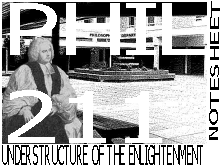 Kant 2
Kant 2 Kant thought it could be shown both that time must have a beginning and that time cannot have had a beginning.
Time must have had a beginning because:
Otherwise an infinite sequence of events must have already elapsed, and this is absurd.
Time cannot have had a beginning because
If it had a beginning, then there must be a reason why it began when it did, and this is to say that a particular moment in time has a causal property, the capacity to bring events into being; which is absurd.
Kant has similar arguments about space (see below).
If these arguments work (you may think they don't), what do they show, taken together? Kant takes them to establish that
'That space and time do not exist as things in themselves' (in Strawson's words, The Bounds of Sense, London, 1966, p.35).
'Kant treats his solution as confirmation of the thesis of transcendental idealism. If space and time, and the world in space and time, existed in themselves, the disjunctions in each case would hold as necessary truths. Since the assumption that they do hold leads to contradiction, we have as good a proof as could be desired that space and time and the natural world do not exist as things in themselves, but only as appearances, are only in us etc.' Strawson, p.35)
The world has limits in space.
'Kant maintains that the very thought of the infinite spatial extent of the world involves the thought of its being possible to complete a temporally infinite process of surveying successive finite parts of the world.' Strawson, p.177.
Space is infinitely extended
'If the world were finite, or limited, in spatial extent, it would stand in a certain relation to empty space outside it, viz., that of being limited by empty space. But empty space is nothing at all, i.e. there would be nothing for the world to be limited by. Therefore it must be limitless or infinite in spatial extent.' Strawson, p. 182.
'In general, if x is in y, then x has a definite spatial relation to y, and it makes sense to ask, for example, where exactly in y is x. But where x is the world and y is space, this question makes no sense.' Strawson, p.182.
But the hypothesis that the world is finite in spatial extent would require us to say that the world is in space, thereby licensing the illegitimate question above.
Closer consideration of the arguments about time:
'The infinity of a series consists in the fact that it can never be completed through successive synthesis.' Kant, CPR, A427/B455.
'If the world had a beginning, then it began at some definite time, say n years ago, and before that time nothing existed at all. But when nothing existed at all, there would be nothing to distinguish one part of time from another and hence nothing to account for the world's beginning to exist at one time rather than another. hence the world cannot have had a beginning.' Strawson, p.177.
The categories of the understanding have to do with bringing sensory inputs under general categories. But our concept of the world is such that everything belongs to one space and to one time framework.
VP